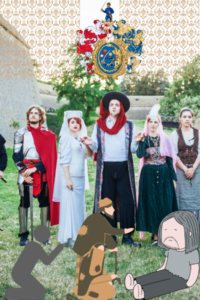I’m Not a Knight: The Case For Dropping Honorifics
Honorific: a title or word implying or expressing high status, politeness, or respect. Common honorifics in modern English are:
Mr.
Ms. (which has largely replaced the older Miss and Mrs.)
Sir
Ma’am
Dr.
Your Honor
Professor
Roughly around the time one hits middle age, they start getting hit with honorifics (much earlier if you’re in the military or part of another traditional institution or subculture). In English-speaking countries, that means “Sir” or “Ma’am.” There are close equivalents in other languages such as “Señor,” “Señora,” “Monsieur,” etc.
What’s Wrong With Honorifics?
I have developed a dislike for honorifics in most situations for several reasons.
- They are rooted in ancient and medieval hierarchical attitudes (more on this below).
- They are often used disingenuously. Our society has less and less faith in authority, whether conferred by title, age, position, or birthright. As a result, the use of formal titles often indicates fear (as an obsequious employee addressing a boss) or the speaker wanting to gain something. That’s why honorifics are often used by people selling, begging, or asking for donations.
- When used by people in authority, polite forms of address can be a thinly veiled precursor to brute force or to get you to comply with heavy handed “requests.” With police, bouncers, or security guards, there’s not much middle ground between, “Sir…” and “Freeze! Hand in the air!” Politeness and respect only go so far when you have no choice but to comply. As at the airport: “Ma’m, please open that bag.”
- They convey otherness. Formality and politeness are appropriate in certain situations but they can also reinforce boundaries between groups.
The Medieval Origin of Honorifics
From Online Etymology Dictionary:
Sir: title of honor of a knight or baronet (until 17c. also a title of priests), c. 1300, a variant of sire (q.v.) that was used originally only in unstressed position. It is not an acronym of anything. It was generalized as a respectful form of address by mid-14c., and eventually extended to all equals or used without regard for rank. It has been used as a salutation at the beginning of letters from early 15c. As a noun, “person of rank or importance,” from 14c.
“Madam” (or the form ma’am, used mostly in the US) has a similar origin.\
In the United Kingdom, “Sir” indicates knighthood. The female equivalent is “Dame.” Higher ranked nobles are addressed as Lord or Lady. Just as the Royal Family holds on as an institution in the UK, so does knighthood. I find it a little sad that icons of the 60s counterculture and 70s rock put on this kind of archaic pedestal. Wasn’t the 60s supposed to be about creating a new, freer, less uptight world?
Honorifics Seem Out of Place in a Casual Culture
While my own experience is primarily in the United States, I’ve also spent a fair amount of time in Canada and the UK and have found that the usage is similar in all these countries. Again, the UK still has the practice of knighthood, but I’m talking about everyday situations.
Since the 1960s, culture has gotten less and less formal. Middle aged and older people increasingly dress like young people. A retired man in the United States, for example, is more likely to dress in jeans and a t-shirt or tracksuit than in more traditional garb. As a point of comparison, I don’t think my father (who lived from 1920-1980) ever even owned a pair of jeans, running shoes, or sweatpants. He would wear a suit to a coffee shop. My father was a strange guy in many ways (I may do a mini bio of him one day) but his manner of dress, partly influenced by 1940s movies, was fairly typical of his generation.
Casualness affects speech as well as dress. In most Western countries, it’s now much more common to address people by their first name rather than by an honorific followed by the last name. This is now common in workplaces, even in traditional industries such as law and finance. It’s getting rare, outside of grammar school classrooms, to refer to people as “Mr. Jones” or “Ms. Smith.”
Of course, social media and texting have accelerated the casual usage of speech. In an era where people can barely be bothered to spell out full words, honorifics seem out of place.
In an informal, youth-oriented culture, formality stands out, including formal modes of address.
I do understand that modern informal culture isn’t to everyone’s liking. To be sure, there’s a lot to be said for the elegance of eras gone by. You’ve probably seen the memes contrasting of old photos of well-dressed men and women from the 19th century to mid-20th century with today’s youth replete with piercings, tattoos, spiky dyed hair, and so forth.
The thing is, we can never really go back. We don’t have to conform to every new trend in style (whether of speech, dress, or behavior). It’s up to everyone to choose what they want to embrace or discard. To me, it’s best to leave honorifics to Renaissance fairs where people can revel in medieval customs.
Honorifics and Gender
In a time when people are encouraged to specify their pronouns, as in “he, his,” or “she, her,” or “they, them,” it’s no longer politically correct to assume someone’s gender. I’m more interested in the arguments against honorifics that I’ve mentioned. However, as these issues are important to many people, this is yet another case against using gender-specific titles in modern times.
Scandinavians Are Abandoning Honorifics
The use of honorifics has declined in several Scandinavian countries, which shows modern societies can get by without them. I haven’t been able to find much in the way of thorough or scholarly research on this topic. In Sweden, honorifics were once common but have largely been discarded.
Iceland seems to be even more extreme in this regard. I watched a video on YouTube that mentioned that people in Iceland almost never use honorifics. I asked how you would address a stranger. For example, in the United States, if you need to get someone’s attention, it would be customary to say, “Excuse me, Sir, you forgot your wallet,” or something like that. Someone on the thread replied that it isn’t really necessary to use a title. Thinking about it, I suppose this is true.
While in a country where honorifics are taken for granted, it might seem rude or overly informal to simply talk to someone, as in “Hey, you!” However, in most situations, we can tell from proximity, context, and body language when someone is addressing you.
I tried to find an article or other content that goes into some detail on why Iceland doesn’t use honorifics but all I could find was a Reddit thread.
The Decline of Aristocracy
The essential reason to retire honorifics is that they are an enduring anachronism from social conditions that we’ve supposedly left behind. “Sir” and “Ma’am” are still commonly used in formal environments such as higher-end restaurants and hotels. Tellingly, the staff in such places take on roles similar to old world servants.

Honorifics are a direct carryover from when peasants, serfs, and even slaves served those of higher status. While in modern Western societies, formal class distinctions have (allegedly) been abolished, the demand for servility in more formal situations suggests that these distinctions persist just below the surface. Certainly, remnants of aristocracy remain -the Royal Family in England, celebrity culture, the fondness for period pieces in books and film. However, few people actually want to live under the feudalistic norms of an aristocracy. So why should we have to speak in such a manner?
I know some people say that as society gets less polite and respectful, it’s more important than ever to hold onto old traditions. To me, however, attitude and intentions count more than words. Using titles rooted in feudal times doesn’t automatically translate into respect. In addition, it’s easy to romanticize the past, whether it’s the Middle Ages or the 1950s. We have to consider where we are now and look forward.
We are living in increasingly fragmented times, with dozens of diverse subcultures co-existing in the same places. So there’s no longer any possibility of settling on norms and behaviors that everyone will agree with. I understand that many people will disagree with me.
No doubt, honorifics are likely to persist for some time, especially in entrenched institutions such as the military. I just invite you to think about it and ask yourself if these forms of address really fit with your beliefs, values, and way of life.
This is an updated version of an article I wrote some years ago on a forgotten platform called Associated Content, which was part of Yahoo and discontinued some years ago.
